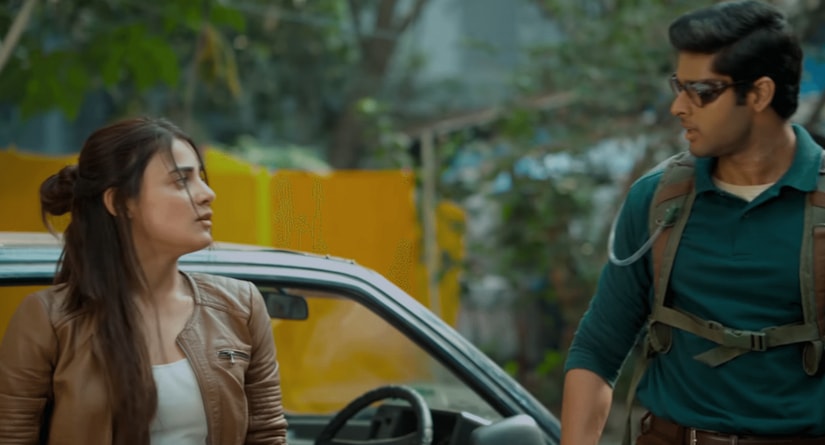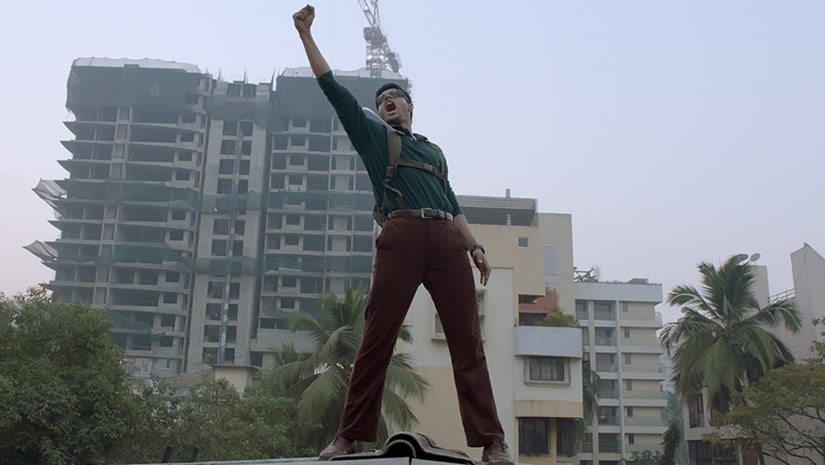With the few glimpses of
Mard Ko Dard Nahi Hota
available till now_,_ it seems the film has managed to break all conventional norms of storytelling in Bollywood. It received widespread praise after the film opened in MAMI 2018 and was also a grand success at the Toronto International Film Festival last year. Featuring Radhika Madan, Abhimanyu Dasani, Gulshan Devaiah, Mahesh Manjrekar and Jimit Trivedi, Mard Ko Dard Nahi Hota
is directed by Vasan Bala. The film’s music offers an eclectic mix of songs, starting with the wackiest track in the film — ‘Rappan Rappi Rap’. Unlike other songs in the album, this track is generously embellished with unorthodox lyrics penned by Garima Obrah. Karan Kulkarni’s composition and Benny Dayal’s vocals lend the song an absurdist trajectory. It pulls in pop-culture references like the one-liner from the Nirma ad (Hema, Rekha, Jaya aur Sushma…), Star Wars’ To a galaxy far far away, Back to the Future among others. The peppy number almost convinces its listeners to sway to a groovy melody. Dayal inculcates his trademark quirky tone to the track, probably making it one of the top-listers in the soundtrack. Kulkarni’s guitar work is also worth mentioning and complements the track well. [caption id=“attachment_4984581” align=“alignnone” width=“825”] A still from Mard Ko Dard Nahi Hota/Image from YouTube.[/caption] The next track brings in a full-fledged Punjabi tadka to the soundtrack. Sung by Sanj V & Karan Kulkarni, ‘Kitthon Da Tu Superstar’ sets an unconventional narrative again. Set almost like a satirical jibe, the track inputs a rap section seamlessly within the otherwise bold, rustic vocals. Vasan Bala had
earlier said that Mard Ko Dard Nahi Hota is a homage to films
he had grown up watching — the likes of Jackie Chan, Bruce Lee and other action films. This fact reflects perfectly in the film’s music. No two tracks can be clubbed together to connote a particular genre or time-period. The songs almost pop out of nowhere, enhancing their impact on the listeners. ‘Tere Liye’ is precisely that and more. A soft, contemplative and melodious track, ‘Tere Liye’ begins with the haunting yet cathartic voices of Kamakshi Rai, Vishal Mishra and Karan Kulkarni. A romantic ode, it charts the narrative of two impassioned lovers. Shantanu Ghatak’s lyrics capture the lovelorn dilemma in a nuanced, effective manner. ‘Tere Liye’ brings in an almost-immediate comparison to other emotionally evocative soft, jazz numbers. ‘Nakhrewaali’, the next track, is a jolt to bring listeners out of the la la land that ‘Tere Liye’ successfully creates. Sung by Karan Kulkarni and Saba Azad, the track is essentially a whiny complaint. Kulkarni manages to add considerable amounts of rock crescendos to the track. It begins with a mellow tone and soon rises to explore an odd space between a loud instrumental and jarring rap sections. Kulkarni goes out of his way to make this track a bizarre one, unsuitable to fit into any particular genre. Omkar Dhumal’s effort with the shehnai is commendable, mostly due to its unexpected placement in the song. [caption id=“attachment_6287851” align=“alignnone” width=“825”]
A still from Mard Ko Dard Nahi Hota/Image from YouTube.[/caption] The next track brings in a full-fledged Punjabi tadka to the soundtrack. Sung by Sanj V & Karan Kulkarni, ‘Kitthon Da Tu Superstar’ sets an unconventional narrative again. Set almost like a satirical jibe, the track inputs a rap section seamlessly within the otherwise bold, rustic vocals. Vasan Bala had
earlier said that Mard Ko Dard Nahi Hota is a homage to films
he had grown up watching — the likes of Jackie Chan, Bruce Lee and other action films. This fact reflects perfectly in the film’s music. No two tracks can be clubbed together to connote a particular genre or time-period. The songs almost pop out of nowhere, enhancing their impact on the listeners. ‘Tere Liye’ is precisely that and more. A soft, contemplative and melodious track, ‘Tere Liye’ begins with the haunting yet cathartic voices of Kamakshi Rai, Vishal Mishra and Karan Kulkarni. A romantic ode, it charts the narrative of two impassioned lovers. Shantanu Ghatak’s lyrics capture the lovelorn dilemma in a nuanced, effective manner. ‘Tere Liye’ brings in an almost-immediate comparison to other emotionally evocative soft, jazz numbers. ‘Nakhrewaali’, the next track, is a jolt to bring listeners out of the la la land that ‘Tere Liye’ successfully creates. Sung by Karan Kulkarni and Saba Azad, the track is essentially a whiny complaint. Kulkarni manages to add considerable amounts of rock crescendos to the track. It begins with a mellow tone and soon rises to explore an odd space between a loud instrumental and jarring rap sections. Kulkarni goes out of his way to make this track a bizarre one, unsuitable to fit into any particular genre. Omkar Dhumal’s effort with the shehnai is commendable, mostly due to its unexpected placement in the song. [caption id=“attachment_6287851” align=“alignnone” width=“825”] Mard Ko Dard Nahi Hota still. YouTube screengrab[/caption] The film’s posters and the brief trailer depict (in parts) a world sunk in the sepia tones of retro Bollywood. ‘Life Mein Fair Chance Kiska’ (Jimmy Mani Song) brings out that aspect. It begins in a very ‘Kolaveri Di’ fashion but soon swims into the 80-90s Bollywood space, heavily populated with SP Balasubrahmanyam songs. Suresh Triveni, Surya Ragunaathan and Veera Fauzia Saxena do a brilliant job in (ironically?) transporting listeners to the 1980s which saw the romantic dalliance between a young Salman Khan and Bhagyashree (also Abhimanyu’s mother) in Maine Pyaar Kiya. With Balasubrahmanyam’s vocal idiosyncrasies, and deft trumpet sections by Kishore Sodha, ‘Life Mein Fair Chance Kiska’ is a hoot and a half. Garima Obrah strikes gold even with this number as the song traverses into inexplicable but hilarious territories. The next track ‘Dreamtime’ has strong jazz influences. Kamakshi Rai’s husky vocals may well remind audiences of British-Indian music parlours with lead singers, adorned in shimmering gowns, crooning to songs of lost love. The song is the shortest in the soundtrack, clocking in just under two and a half minutes. Karan Kulkarni’s next offering ‘Shaolin Sky’ draws from K-pop music. With electronic voices, sharp tones and the concept of repeating lyrics into a fade-out, Kulkarni achieves the unimaginable — to make a commercial Bollywood track sound similar to one produced by a South Korean pop band. The soundtrack finishes with a rendition of ‘Kitthon Da Tu Superstar’ (Shooter version). It retains much of the original track, but adds a few slow, contemplative sections to it. Mard Ko Dard Nahi Hota seems to offer something refreshing and new not only in terms of a story but also as a cinematic experience. Its soundtrack has a marked contribution to that especially since it is full of pleasant surprises. Mard Ko Dard Nahi Hota is scheduled to hit theatres on 21 March. Listen to the complete soundtrack
here
.
Mard Ko Dard Nahi Hota still. YouTube screengrab[/caption] The film’s posters and the brief trailer depict (in parts) a world sunk in the sepia tones of retro Bollywood. ‘Life Mein Fair Chance Kiska’ (Jimmy Mani Song) brings out that aspect. It begins in a very ‘Kolaveri Di’ fashion but soon swims into the 80-90s Bollywood space, heavily populated with SP Balasubrahmanyam songs. Suresh Triveni, Surya Ragunaathan and Veera Fauzia Saxena do a brilliant job in (ironically?) transporting listeners to the 1980s which saw the romantic dalliance between a young Salman Khan and Bhagyashree (also Abhimanyu’s mother) in Maine Pyaar Kiya. With Balasubrahmanyam’s vocal idiosyncrasies, and deft trumpet sections by Kishore Sodha, ‘Life Mein Fair Chance Kiska’ is a hoot and a half. Garima Obrah strikes gold even with this number as the song traverses into inexplicable but hilarious territories. The next track ‘Dreamtime’ has strong jazz influences. Kamakshi Rai’s husky vocals may well remind audiences of British-Indian music parlours with lead singers, adorned in shimmering gowns, crooning to songs of lost love. The song is the shortest in the soundtrack, clocking in just under two and a half minutes. Karan Kulkarni’s next offering ‘Shaolin Sky’ draws from K-pop music. With electronic voices, sharp tones and the concept of repeating lyrics into a fade-out, Kulkarni achieves the unimaginable — to make a commercial Bollywood track sound similar to one produced by a South Korean pop band. The soundtrack finishes with a rendition of ‘Kitthon Da Tu Superstar’ (Shooter version). It retains much of the original track, but adds a few slow, contemplative sections to it. Mard Ko Dard Nahi Hota seems to offer something refreshing and new not only in terms of a story but also as a cinematic experience. Its soundtrack has a marked contribution to that especially since it is full of pleasant surprises. Mard Ko Dard Nahi Hota is scheduled to hit theatres on 21 March. Listen to the complete soundtrack
here
.
A Theory of Communications enthusiast still learning social skills. Forever curious about the effects of good food on grumpy people.
)